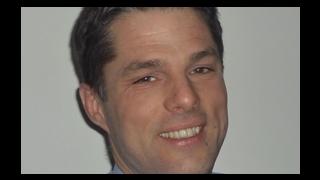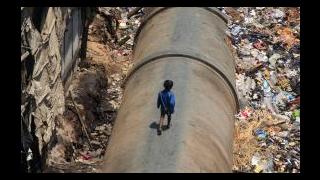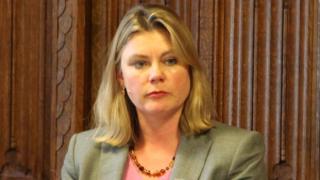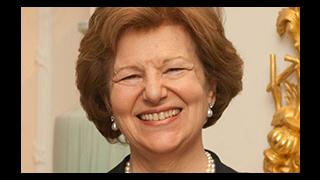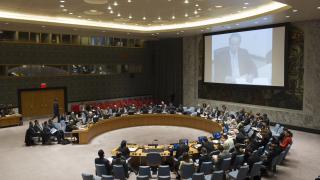
The year 2015 could prove a turning point for the world. The international community has set itself an ambitious to-do list, with a fundamental renegotiation of international development goals, a major review of the Nuclear Non-Proliferation Treaty and discussions on a global climate framework all scheduled to take place. Together, they have the potential to alter radically the global landscape.
In the UK, those areas with domestic resonance – how much to spend on aid, whether to pursue shale gas extraction and the future of the Trident nuclear weapons system – will come under scrutiny in the run-up to 2015. Scotland, which is home to the Trident naval base, will hold an independence referendum in 2014. The UK’s general election is scheduled for the following year. At UNA-UK’s 2013 Policy Conference, members from around the country discussed the interplay between the national and global dimensions of these issues, and the prospects for action at either level.
This special issue of New World continues these debates. In our main essay, International Development Secretary Justine Greening sets out the UK’s hopes for the post-2015 agenda.
Our first briefing looks at the trajectory of the Millennium Development Goals. In our essay, nuclear expert Paul Ingram argues that global disarmament must be the most important measure of action on Trident renewal. Our second briefing provides a forecast for the 2015 climate talks, while conservationist and former MEP Stanley Johnson considers the achievements and shortcomings of UN environmental action. And as UN chemical weapons inspectors begin their work in Syria, we feature an interview with Rolf Ekéus, who headed the Iraq WMD inspection team in the 1990s.
The diplomatic deficit
During the first decade of this century, both progressive and regressive trends occurred in parallel. The emergence of development goals and the responsibility to protect principle sat alongside the ‘war on terror’ and the backsliding on absolute taboos such as torture.
Today, there are fewer drivers of progressive action. Governments have become reluctant to look outwards, focused as they have been on dealing with the fall-out from slower growth and recession. Many of their citizens agree. Now that we are all feeling the pinch, we are less keen to take long-term or global action.
People around the world are also losing confidence in the ability of politicians and institutions to deliver tangible outcomes for their lives. Increasingly, they are taking action on the streets and online. Few governments have reacted appropriately. The scale and pace of change has put states on the back foot. On climate change, even the best outcome realistically in sight for 2015 falls far short of what is needed. Development systems are still stuck in a North- South, top-down paradigm that sits uneasily with the spread of economic and popular power. Post-Cold War military postures don’t match modern security threats.
Together, these factors have produced a severe deficit in diplomacy. Pressing issues like nuclear disarmament have been kicked down the road while others, notably the search for a comprehensive Arab-Israeli peace settlement, appear to have been abandoned entirely.
Lessons from Syria?
So how do we move forward? For over two years, the bloodshed in Syria has served as a grim reminder of the consequences of diplomatic stagnation. But even in this seemingly intractable situation, movement is possible.
As New World goes to press, UN weapons inspectors report that the destruction of Syria’s chemical weapons is underway. The past weeks have seen the likelihood of international military intervention increase and recede, following the reported chemical attack that killed hundreds of people on the outskirts of Damascus on 21 August. A UN report has since confirmed that the nerve agent sarin was used.
The unacceptability of chemical weapons is a near-universal norm, with an international convention on their prohibition and destruction. Their use is also listed as a war crime in the Rome Statute of the International Criminal Court.
Last year, President Obama described them as a “red line” for the US on Syria, although he was less clear on what the consequences of crossing this line might be. After 21 August, calls for the use of force grew louder. A clutch of countries within and outside the region, such as Qatar and the UK, were supportive. But the UK Parliament (narrowly) rejected the military course. Many believed the US Congress would do the same. In both countries, public opinion fell more clearly on the non-intervention side.
In the end, this option was avoided as the US and Russia seized a diplomatic exit route whereby Syria would agree to disarm under the auspices of the Organisation for the Prohibition of Chemical Weapons (OPCW). The plan was formalised by the Security Council through Resolution 2118 in a welcome return to unanimity.
While the destruction of Syria’s stockpile – one of the largest in the world – is a contribution to global security, the central concerns of arresting the suffering of civilians and the implosion of Syria remain unaddressed. UNA-UK hopes that the Council’s strong statement on humanitarian access and the scheduling of peace talks for November are signs of renewed engagement.
Syrians living in fear are entitled to wonder what impact, if any, the chemical weapons deal will have on their day-today lives. They could rightly ask why the international community was able to act so quickly on this issue, but not on over 100,000 casualties from conventional arms. Nonetheless, the episode has demonstrated that diplomacy can work, that public opinion counts, and that the UN has important tools, like the OPCW, that can be called upon.
Two-way leadership
Public opinion can be an important force, for better or worse, in the international arena. Large grassroots movements have been at the heart of advances such as the cluster munitions ban and the Arms Trade Treaty, adopted in April and now signed by a majority of UN member states.
Policymakers out of step with the public can be caught off guard. For years, UK officials dismissed anti-nuclear test campaigners as naïve, pointing to the supposed impossibility of other states giving them up. Then, Russia, France and the US gave in to public pressure. They instituted moratoria, clearing the path for negotiations on an international test-ban treaty. The UK scrambled to adapt its position (and faced a steep bill for a planned nuclear test that had to be aborted).
But progressive government is necessary too. With economic pressures at home, people may call for cuts to development spending or contributions to peacekeeping. They may prefer short-term outcomes such as lower energy bills to long-term investments in renewable infrastructure.
There was strong popular support for the death penalty at the time it was abolished in the UK, Germany and France. Since then, there has been a continuing decline in public approval of capital punishment and events like the 2005 London bombings or Anders Breivik shootings in Norway don’t appear to have had a lasting effect on this trend.
From local to global and back
When a critical number of countries is reached, national action can produce a global ripple effect. In the 1970s, a number of states responded to public campaigns and scientific studies by regulating chlorofluorocarbons (CFCs). By 1987, the Montreal Protocol, an international treaty on reducing CFCs, had been established. Two years later, the European Community decided to ban CFC production and the following year, a global target of eliminating them by 2000 was agreed.
Even when international progress is slow, popular opinion and national leadership matter. Think of the shift in perceptions of nuclear weapons, from legitimate weapons in the 1950s, to a necessary evil in the 1980s, to the modernday consensus that disarmament is essential, albeit difficult to achieve.
At UNA-UK, we seek to drive action by stimulating debate on the alignment of global and local interests, and calling for international dialogue, especially on the hardest issues. Above all, we push for UN mechanisms to be central to these discussions. They may be imperfect, but they have shaped what is now an undisputed norm – that of an international community expected to tackle shared global challenges and obliged to use constructive diplomacy to find compromises.
Natalie Samarasinghe is Executive Director of UNA-UK.



